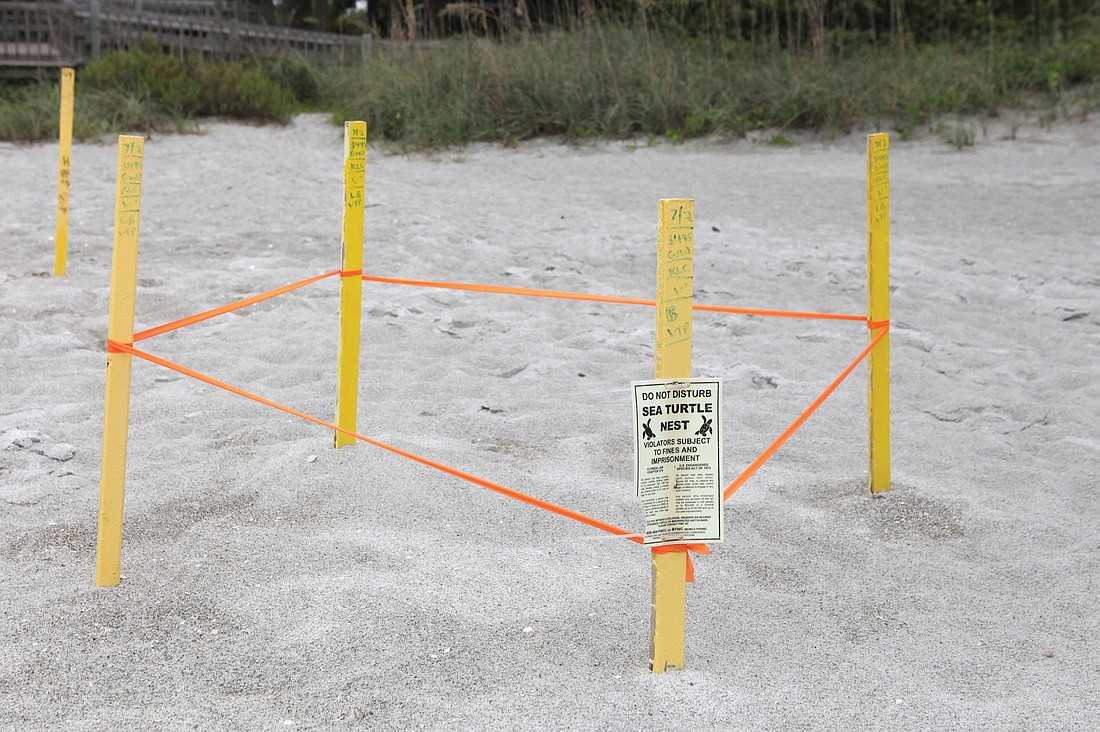- April 16, 2024
-
-
Loading

Loading

Funding for Mote Marine Laboratory’s turtle-monitoring programs has declined, but those nesting turtles haven’t gotten the memo.
Loggerheads nested in record numbers last year on the 40-mile stretch of beach that Mote patrols.
This year, some Gulfside properties will have to pay for part of the cost of marking nests as the result of a new policy Mote implemented, in which officials will continue to survey the beach daily, while only marking nests with wooden stakes once a week.
Properties that manually rake their beaches or that don’t rake them at all won’t see any changes this season.
But properties that hire contractors to mechanically rake their nearby beaches will face an extra fee this year that will amount to $1.16 per foot of beach on Longboat Key. (Fees are 57 cents per foot on Lido Key and 88 cents per foot on Siesta Key.)
That’s because mechanical beach raking requires a permit from the Florida Department of Environmental Protection (FDEP) during nesting season, which runs from May through October. Those permits require an FWC Marine Turtle Permit holder to survey and mark nests so that equipment can avoid them. Neither requirement is new. What is new is the charge for the service that properties used to get for free.
Property managers told the Longboat Observer they learned about the requirement April 19, at an educational meeting FWC and FDEP officials held. The change will amount to just more than $100 for smaller properties to more than $2,000 for large condominiums such as Beachplace.
Reactions from property managers who spoke to the Longboat Observer was mixed.
“It’s just an added fee that seems to be unjustifiable, the way they went about it, 11 days before season,” said Steve Zook, who manages the 40-unit Beachcomber. He said the change would cost the property more than $200 for the season and might result in raking the beach less than its usual several times per quarter.
Club Longboat Manager Steve Beirman said that his association opted not to mechanically rake its beach this season after learning about the fees approximately one week before the start of nesting season.
“We set our budgets back in November and had never heard of it,” Beirman said. “We’re told within a week that we have to pay a $600 charge.”
Beachplace Manager Nick Luman said the association has worked out an agreement so that Mote will mark its nests each Friday, the day that the association will rake its 1,800-foot beach. Still, the increase will cost the association $2,069 for six months.
He said he understands that Mote is a non-profit and that it costs money to mark nests. Still, the requirement came as a surprise, even though it won’t strain the budget of the 300-unit condominium.
“We were very shocked,” Luman said. “There was no warning and no information leading up to it. Any time you have to take money and pay for a non-budgeted item, it’s difficult to find.”
Still, some properties, such as Aquarius Club, received good news.
It won’t have to pay additional costs for monitoring its nearby beach because the town has contracted with Mote to perform turtle monitoring as required by permits for the upcoming beach renourishment project.
Hayley Rutger, public relations coordinator at Mote, wrote in an email to the Longboat Observer that to determine fees Mote uses “a complex formula” that includes factors such as how many nests are laid in an area on average and how many linear feet of property need to be covered.
Although Mote will mark fewer nests this season, Rutger explained that it’s a strategy that’s widely used on Florida’s East Coast, where nesting numbers are higher.
“Even in areas with many nests, it’s reportedly rare for beachgoers to accidentally open up an unmarked nest,” Rutger wrote. “More important challenges are natural events like storms, along with human impacts, that we can all work to reduce, such as artificial lights shining on the beach, which can disorient sea turtles and their young.”
PROPERTIES HAVE STAKE IN NEW MOTE POLICY
Managers of the following Gulfside properties told the Longboat about how changes in the frequency of marking turtle nests will affect their properties.
Aquarius Club
Address: 1701 Gulf of Mexico Drive
Plans: It won’t have to pay additional costs for monitoring its nearby beach because the town has contracted with Mote to perform turtle monitoring as required by permits for the upcoming beach renourishment project.
Additional cost: $0
Beachcomber
Address: 2721 Gulf of Mexico Drive
Plans: The property could reduce its typical habit of raking the beach several times per quarter.
Additional cost: More than $200 for six months
Beachplace
Address: 1100 block of Gulf of Mexico Drive
Plans: Beachplace arranged with Mote to mark nests on Fridays, its usual raking day.
Additional cost: $2,069 for six months
Casa Del Mar Beach Resort
Address: 4621 Gulf of Mexico Drive
Plans: Continue to rake every other week
Additional cost: Less than $500 for six months
Cedars West
Address: 5655 Gulf of Mexico Drive
Plans: Cedars West doesn’t mechanically rake its beach and won’t be impacted by the changes.
Additional cost: n/a
Club Longboat
Address: 5055 Gulf of Mexico Drive
Plans: The condominium won’t mechanically rake its beach this year because it set its budget in November. In past seasons, it raked the beach before holidays or in cases of seaweed or red tide.
Additional cost: Raking would have cost the condo an additional $600 for six months.
La Playa Gulf Front Condominiums
Address: 4425 Gulf of Mexico Drive
Plans: The condominium doesn’t rake the beach unless there’s a major storm, so the changes won’t impact the property.
Additional cost: n/a
Sanctuary condominiums
Address: 500 block of Sanctuary Drive (behind the Longboat Key Club & Resort’s Islandside gates
Plans: The condominium will continue to rake its beach monthly.
Additional cost: Approximately $1,400
View Properties have stake in new Mote policy in a larger map